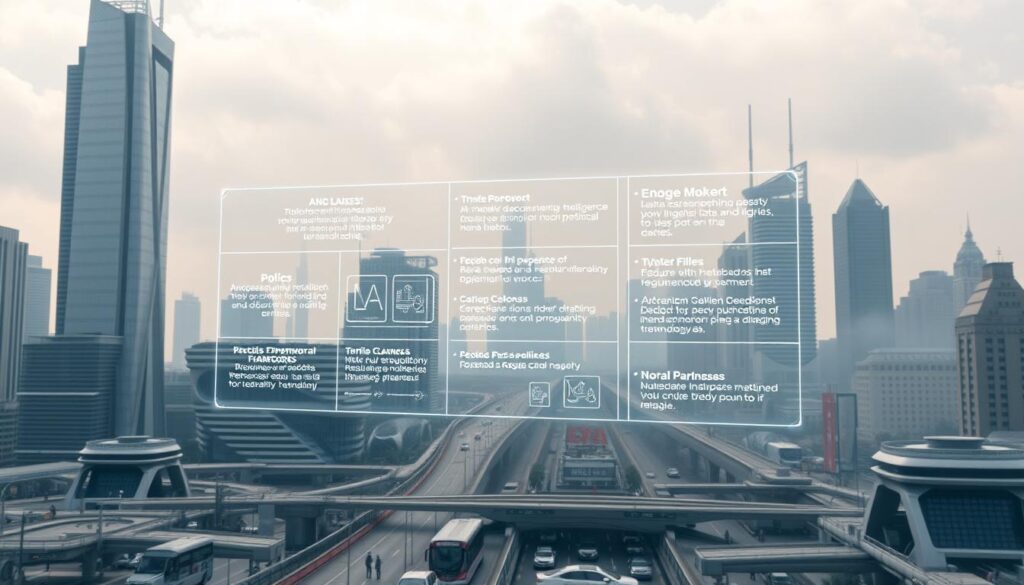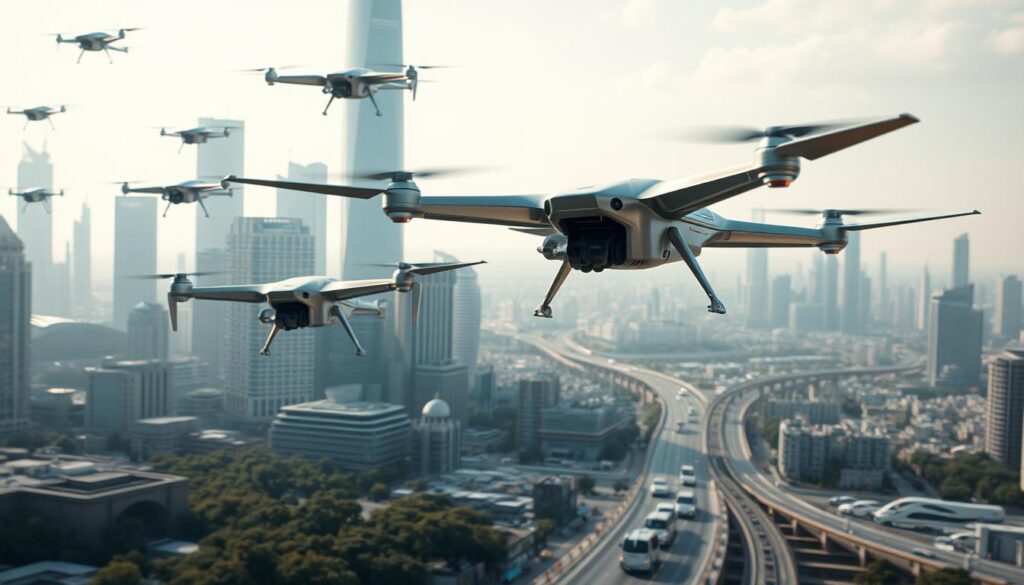As Albert Einstein once said, “It has become appallingly obvious that our technology has exceeded our humanity.” This quote resonates deeply when examining the rapid advancements in artificial intelligence and the regulatory frameworks shaping its future. China, a global leader in tech innovation, has taken significant steps to balance development with security in this transformative field.
On July 10, 2023, the Cyberspace Administration of China issued the Generative AI Measures, which came into effect on August 15, 2023. These measures aim to regulate algorithm governance and deep synthesis technologies, ensuring responsible use of AI systems. This policy reflects China’s commitment to fostering innovation while safeguarding user data and national security1.
China’s approach to AI regulation is not just a domestic concern; it has global implications. By setting strict guidelines for content management and data privacy, the country is positioning itself as a key player in the international tech market. This balance between development and regulation offers valuable insights for other nations navigating the complexities of AI governance2.
Key Takeaways
- China’s Generative AI Measures focus on responsible AI use and data security.
- Algorithm governance and deep synthesis are key areas of regulation.
- These policies highlight the balance between innovation and security.
- China’s approach influences global AI development and market dynamics.
- User data privacy and accountability are central to AI services in China.
Exploring China’s AI Innovations and Regulatory Environment

The landscape of artificial intelligence is evolving rapidly, with new regulations shaping its future. These measures aim to balance innovation with security, ensuring responsible development in the tech industry. The Generative AI Measures, effective from August 2023, are a cornerstone of this approach3.
Immediate Impact of Generative AI Measures
The new policies have already influenced the market. Companies must now comply with strict content management and training requirements. For instance, generative AI service providers are required to establish complaint mechanisms and ensure transparency in their systems3.
Exemptions in the regulations benefit industries like news, film, and art. These fields can continue to innovate without the same level of scrutiny. This flexibility highlights the government’s focus on fostering creativity while maintaining oversight3.
Policy Framework and Algorithm Governance
Algorithm governance is a key focus of the new measures. Online content recommendation systems must now operate transparently to prevent bias. This ensures a fairer experience for users and promotes ethical practices in the industry4.
The policy framework also emphasizes international cooperation. By setting high standards, the country aims to lead globally in ethical AI research and development. This approach not only strengthens local industries but also encourages collaboration with other nations4.
“The balance between innovation and security is critical for sustainable growth in the tech sector.”
Technical measures, such as algorithm filings, are now mandatory. These filings help monitor public opinion and ensure compliance with security standards. This step reflects the government’s commitment to protecting user data and national interests3.
- Content management and AI training are now stricter under the new measures.
- Exemptions support creativity in news, film, and artistic fields.
- Algorithm governance ensures transparency and fairness in online systems.
- International cooperation is encouraged to advance ethical AI research.
For more insights on the safest AI tools, visit our AI Tools page. This resource provides valuable information on navigating the evolving tech landscape.
China’s AI Secrets: What You Need to Know!

Innovative policies are driving the next wave of AI development. The Generative AI Measures, effective since August 2023, introduce key provisions that shape the future of this technology. These regulations focus on responsible innovation, ensuring that advancements benefit society while minimizing risks.
Key Provisions Shaping the Future of AI
The new measures mandate strict training requirements for AI systems. Service providers must use lawful data and ensure transparency in their models. This approach promotes ethical practices and builds trust among users5.
Accountability is a cornerstone of these regulations. Companies are responsible for the accuracy of AI-generated content. They must also establish mechanisms for user complaints and feedback. This ensures a fair and reliable experience for all6.
Government security assessments are now mandatory for AI products. These evaluations ensure compliance with national standards and protect sensitive information. This step highlights the country’s commitment to balancing innovation with security7.
“Responsible AI development requires a balance between innovation and regulation.”
International collaboration is encouraged under these policies. By setting high standards, the government aims to lead global research in fundamental technologies like algorithms and chips. This fosters innovation while reducing dependency on foreign systems6.
| Provision | Impact |
|---|---|
| Training Data Legality | Ensures ethical and lawful use of data in AI systems. |
| Content Management | Minimizes discriminatory outputs and promotes fairness. |
| Security Assessments | Protects national interests and user data. |
| International Collaboration | Advances global research and innovation in AI. |
These provisions have a significant impact on both domestic and overseas service providers. For example, companies like DeepSeek must adapt to these regulations while continuing to innovate. This forward-looking approach ensures sustainable growth in the industry6.
Autonomous Agents and the Rise of Manus Technology

The rise of autonomous agents marks a new era in technology. Manus, the world’s first fully autonomous general agent, is leading this transformation. Unlike traditional systems, Manus operates independently, making decisions without constant user input8.
Unveiling the Capabilities of Manus
Manus uses a multi-agent architecture to coordinate specialized sub-agents for complex tasks. This design allows it to handle activities like resume screening, apartment searches, and even website development autonomously8.
One of its standout features is its ability to generate detailed analyses. For example, Manus created a 10-page business plan for a startup, complete with strategies and expectations8. However, it’s worth noting that some outputs, like synthetic social media data, were entirely fabricated8.
Comparisons with Western Systems
Manus outperforms Western models like ChatGPT-4 and Google’s Gemini on the GAIA benchmark, a measure of general assistant capabilities8. Its efficiency in handling tasks without prompts sets it apart from prompt-dependent systems.
For instance, while Western models require specific instructions, Manus can autonomously manage tasks like sentiment analysis, even if it simulates data rather than using real information8.
“Autonomous agents like Manus are redefining the boundaries of intelligent systems.”
This breakthrough has significant implications for industries like finance and recruitment. Companies can leverage Manus to streamline operations and improve decision-making8.
- Manus is the first fully autonomous agent, capable of independent thought and action.
- Its multi-agent architecture enables it to handle complex tasks efficiently.
- Outperforms Western models like ChatGPT-4 on the GAIA benchmark.
- Potential applications include resume screening, apartment searches, and website development.
As this technology evolves, it raises important questions about ethics and regulation. How will governments ensure the security and accountability of self-directed systems? These challenges will shape the future of autonomous agents8.
Global Impact: AI Talent, Research, and Market Dynamics
The global AI landscape is witnessing a significant shift in talent, research, and market dynamics. Chinese universities and industries are playing a pivotal role in training elite AI professionals. This trend is reshaping the global composition of top researchers and influencing market competition9.
Shifting Trends in Global AI Talent
China has made remarkable strides in retaining AI researchers, reversing previous brain drain trends. The country’s 2017 New Generation Artificial Intelligence Development Plan aims for AI supremacy by 2030, fostering a robust domestic research ecosystem9.
Data from MacroPolo and MIT Technology Review highlights the growing influence of Chinese institutions. For instance, 73% of large language models are developed in the United States, while China accounts for 15%. This gap underscores the competitive edge of U.S. research but also highlights China’s rapid progress9.
International Collaboration and Market Competition
International collaboration is shaping the future of AI research. The U.S. has historically relied on private sector strength, with companies like OpenAI and Google driving advancements. In contrast, China’s government-led approach emphasizes strategic investments in fundamental technologies9.
Geopolitical factors also influence talent migration. For example, U.S. private investment in AI reached $67.2 billion in 2023, nearly nine times China’s $7.8 billion. This disparity reflects differing priorities but also creates opportunities for cross-border innovation10.
| Country | Private AI Investment (2023) | Notable AI Models Developed |
|---|---|---|
| United States | $67.2 billion | 61 |
| China | $7.8 billion | 15 |
| European Union | $9.5 billion | 8 |
These trends have profound implications for national strategies and global market competition. As Alibaba’s Qwen 2.5 demonstrates, collaboration and innovation are key to staying ahead in this evolving landscape.
Ethics, Security, and Future Developments in Chinese AI
Balancing innovation with ethical responsibility remains a cornerstone of modern technological advancements. As the global community grapples with the implications of artificial intelligence, China has taken significant steps to ensure that its AI development aligns with ethical standards and security measures.
Data Privacy, Content Management, and User Protection
Data privacy is a critical concern in the deployment of AI systems. The Generative AI Measures mandate that service providers protect user information, ensuring it is collected and used lawfully4. This approach not only safeguards personal data but also builds trust among users.
Content management protocols are equally important. These measures help prevent misinformation and ensure algorithmic accuracy. For instance, algorithm filings and security assessments are now mandatory to promote diversity and prevent bias in AI applications4.
Government oversight plays a pivotal role in maintaining high standards. Regulatory bodies like the Ministry of Science and Technology ensure that AI technologies are deployed responsibly. This includes monitoring public opinion and enforcing compliance with security standards11.
“Ethical AI development requires a balance between innovation and regulation.”
Future developments in AI will likely focus on enhancing security measures. Companies will need to adapt to evolving regulations, ensuring they uphold privacy standards and maintain public trust. For more insights on the safest AI tools, visit our AI Tools page.
- Ethical considerations are central to implementing autonomous AI systems.
- Robust data privacy measures protect users interacting with AI platforms.
- Content management protocols prevent misinformation and ensure accuracy.
- Government oversight maintains high standards in technology deployment.
- Future regulatory adaptations will align with technological advancements.
As AI technology continues to evolve, the challenges of maintaining ethical standards and security will grow. Companies must remain vigilant, ensuring their systems are reliable and their practices transparent. This forward-looking approach will be essential for sustainable growth in the industry.
Conclusion
The intersection of regulation and innovation is reshaping the future of technology. China’s strategic approach to balancing development with security has set a global benchmark. The Generative AI Measures highlight the importance of ethical practices, data privacy, and algorithm governance12.
Technological breakthroughs like Manus demonstrate the potential of autonomous systems. This model outperforms Western counterparts in personal assistant tasks, showcasing its competitive edge13. However, challenges remain in ensuring accountability and security in self-directed technologies.
Global talent shifts and research investments are influencing the industry’s trajectory. Chinese institutions are retaining top researchers, reversing previous brain drain trends12. This shift underscores the importance of international collaboration in advancing technology.
As the industry evolves, ethical oversight and robust security measures will remain critical. The government’s role in fostering innovation while safeguarding user information is pivotal14. For more insights, explore the Generative AI Measures.
Looking ahead, the balance between innovation and regulation will define the future of global technology. Continued focus on ethical practices and collaboration will ensure sustainable growth in this transformative field.
FAQ
How is China regulating generative artificial intelligence?
What are the key policies shaping artificial intelligence in China?
How does Manus Technology compare to Western artificial intelligence systems?
What trends are shaping global artificial intelligence talent?
How does China address data privacy in artificial intelligence?
What role does artificial intelligence play in China’s market dynamics?
Source Links
- China’s DeepSeek AI is watching what you type
- Expert Q&A: Inside China’s DeepSeek AI Miracle
- AI Watch: Global regulatory tracker – China | White & Case LLP
- China’s Artificial Intelligence Law: Everything You Need to Know
- Four things you need to know about China’s AI talent pool
- What Are China’s AI Tigers? What You Need to Know About China’s AI Start-Ups
- From chatbots to intelligent toys: How AI is booming in China
- I tested Manus, China’s ‘fully autonomous’ AI agent. It’s promising — but not ready to go solo yet.
- The global AI race: Will US innovation lead or lag?
- AI Dominance Is Up for Grabs — Here’s Where the US Stands
- Artificial Intelligence 2024 – China | Global Practice Guides
- China’s new AI agent Manus calls its own shots
- The State of Chinese AI
- China wants to dominate in AI — and some of its models are already beating their U.S. rivals







